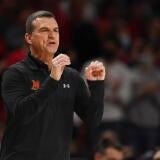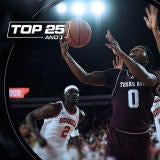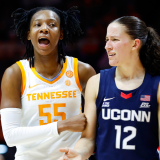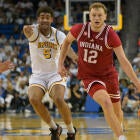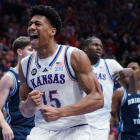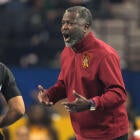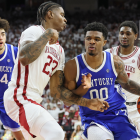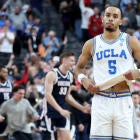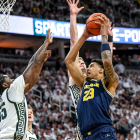The surprising stat that explains Tennessee's surprising turnaround
How unselfish play has the Volunteers racking up victories this season
Rick Barnes' Tennessee Volunteers are one of the most pleasant surprises of this college basketball season. They are 7-1 leading into Sunday's home test against No. 7 North Carolina. They're ranked 20th in the AP Top 25 Poll, 16th in the CBS Sports Top 25 (and one) and 22nd on KenPom, and had a nice trip to the Battle 4 Atlantis tournament a few weeks back where they beat Purdue and gave Villanova, now the No. 1 team in the country, a run for its money.
Why, you wonder, is a program that hasn't been above .500 or made an NCAA tournament since 2014, and that was picked to finish next-to-last in the SEC in the preseason, suddenly ascendant in what appears to be a talented and ascendant SEC?
I could walk you through dozens of reasons. Like about Barnes being a damn fine basketball coach on top of being a damn fine human being. Or about Tennessee hitting 3-pointers at a 41.2 percent clip, better than all but four major-conference schools. Or about how one of the youngest teams in the nation last year got one year older this year. Or about sophomore power forward Grant Williams, who has been an absolute monster for this team as he is averaging 16.1 points and 7.3 rebounds as this team's most energetic, powerful and versatile player. Or about how this team is as tough as they are balanced, with four players averaging in double figures and a coach that uses his bench more than all but five major conference schools.
These are all true.
But I'm going to boil Tennessee's early-season success down to one simple statistic that shows how they are doing exactly what Barnes wants them to do, an achievement that is a coach's dream in the modern-day, keep-the-ball-moving style of basketball perfected by NBA teams like the San Antonio Spurs and the Golden State Warriors.
More than 70 percent of Tennessee's made shots are assisted buckets – 70.8 percent, to be exact, according to KenPom. That ranks higher than any other team in college basketball. It's a single stat that underscores many a college basketball coach's dream: Be unselfish, move the ball, create for others more than you create for yourself.
Villanova, a team whose ball movement is year-in, year-out among the most lauded in college basketball and who this season has the nation's most efficient offense, assists on 54.7 percent of its made field goals, 125th in college basketball. Duke, the nation's most talented team and with the second most efficient offense in the country, assists on 57.9 percent of its made field goals, good for 69th in the collegiate game.

Of teams ranked in the AP Top 25, only a handful are even close to Tennessee in assist rate: Michigan State (9th in the country at 65.7 percent), Texas A&M (14th at 63.2 percent) and TCU (26th in the country at 61.5 percent).
"The way we set our offense up is based on movement, on cutting and passing and catching," Barnes said earlier this week when I caught up with him. "We want to make every cut a purposeful cut, and we want the passer engaged. We're not a heavy ball-screen team where we put the ball in someone's hands and say, 'Go create something.' We want to run, to move the ball and pass it, and when we do, we feel like that's when we get better shots. We're not asking anyone to create one-on-one," Barnes said. "We do that within our offense. The biggest key is getting everyone to buy into their role on the team."
This was not always the case with Barnes-coached teams at, say, Texas, when he coached some of the elite recruits in the nation. The idea of having, say, a Kevin Durant or a LaMarcus Aldridge on your team and not building your entire offensive attack around that one player is ludicrous. Barnes knew that, and so of course that was what he did.
At Tennessee, Barnes has constructed a team out of recruits who have not been nearly as high-level as what he'd gotten at Texas. Look at the recruiting rankings of Barnes' top five scorers: Grant Williams was the 191st-ranked recruit in the class of 2016, per 247Sports.com. (Yeah, I don't get it either.) Junior small forward Admiral Schofield, averaging 11.1 points per game, was the 251st-ranked recruit in the class of 2015. Point guard Lamonte Turner, averaging 10.3 points per game, was the 144th-ranked recruit in the class of 2015. And sophomore shooting guard Jordan Bowden, averaging 10.3 points per game, was the 262nd-ranked recruit in the class of 2016.
This tells me a few different things: That recruiting rankings serve a purpose, but they are not the end-all-be-all for a program's success. That teams can succeed by recruiting high-character, unselfish guys who fit into a coach's ethic. And that we forget what a great talent developer Barnes is.
"The Spurs have been doing it forever," Barnes said. "Most guys who come into basketball, their whole mindset is scoring, scoring, scoring – shoot the ball. Coaches have to figure out how to find each guy's individual talent. Coaches have to adjust to their players. You don't want to force-feed your guys. We always want to be an up-tempo team, the same philosophy of moving the ball, rebounding and playing defense."
What Barnes has found, in his third season at Tennessee, is a group of young men that have bought in on a culture of unselfishness. He worries about his players taking their pedal off the gas if they start to feel complacent with their early-season success. He wants them to continue to practice with an edge; consistency can hurt these young teams. Most of all, he wants them to stay unselfish. More than any other philosophy, that's the one this team is built on.
"We hope we can survive guys not having a great night – our system is based on that," Barnes said. "If a guy is not playing well, we're not building a lot around one person because we don't think our team is made like that. With a young group it's continuing to understand roles and what we need to do. When a guy has nice game, scores a lot of points, sometimes he'll come out and say, 'I need to do it again.' But you can't do that the next game. You'll get lost. You need to impact winning, a winning culture day in and day out."


